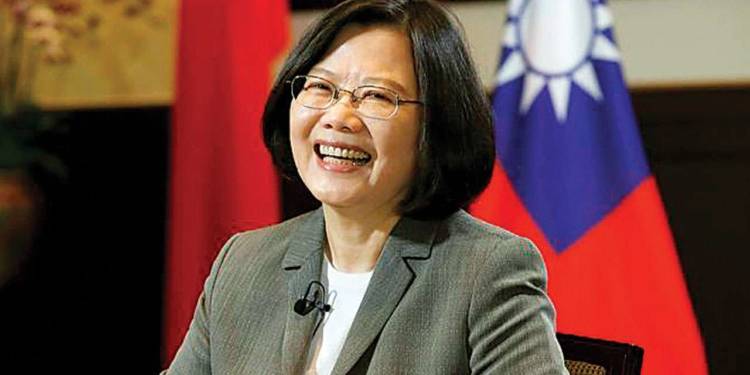As Taiwanese President Tsai Ing-wen takes oath for her second term on Wednesday, which she won in a landslide in January this year, Taiwan, which was until recently diplomatically isolated is now finding that the world is standing with the country in these unprecedented times. In just 4 years, Tsai Ing-wen has completely changed how the world looks at Taiwan and delivered a knock out blow to Xi Jinping’s dream of making Taiwan a part of the People’s Republic of China.
Make no mistake, before Tsai rose to power in 2016, the island nation had almost given up as they had accepted that it is only a matter of time when Taiwan is “reunified” with the mainland as the ruling Kuomintang increasingly tilted towards China and a reunification was a foregone conclusion.
When the Kuomintang Party led the Republic of China was ousted by the rebels led by Mao Zedong in the Chinese civil war in 1949, the Kuomintang Party leaders escaped the mainland and settled in Taiwan and ever since then, China has been desperately trying to reunify Taiwan.
Taiwan’s political landscape to an extent mirrors that of India as just like the Indian National Congress, the Kuomintang Party had been ruling Taiwan for a majority of time post-1949.
The 8 years of Kuomintang Party rule from 2008 to 2016 raised the hopes of the Communist regime regarding the ‘unification of entire China’, the ultimate agenda of Xi Jinping. But, in the 2016 Presidential election, Tsai, a pro-democracy and anti-China leader was elected, and since then, China has made every effort to sabotage Taiwanese freedom. Tsai swept to power yet again in January 2020 after she supported the Hong Kong democracy protests as her party garnered over 8 million votes while the opposition Kuomintang folded up with less than 6 million votes.
Taiwan has made giant strides under Tsai with most notably being her stupendous handling of the Wuhan coronavirus pandemic which has shot up her approval ratings of an all-time high of 61%. Taiwan, despite its proximity to China has reported only 440 odd cases of the virus with 7 fatalities which has caught the eye of the world.
In her first term itself, Tsai managed to greatly irk China as in a bold move, she dialed Donald Trump in December 2016 and secured the country’s first American fighter jet deal in 30 years.
China being true to its characteristics, tried to diplomatically isolate Taiwan as the island country is now recognised by a paltry 15 countries of which most of them are Latin and Pacific countries with little say in International Affairs. But Taiwan doesn’t need to worry, as the USA unanimously has passed the TAIPEI Act which will see the USA lobbying to get diplomatic recognition for Taiwan. The TAIPEI Act also mandates the USA to safeguard Taiwan in case of a Chinese military aggression.
Tsai has steadfastly refused to accept the “One China” policy and has been proven to be a calm head as she has sought to benefit from the deteriorating relations between the US and China. Tsai has stressed for better relations with China which does not recognise Taiwan as an independent country as she said, “Cross-strait relations have reached a historical turning point. Both sides have a duty to find a way to co-exist over the long term and prevent the intensification of antagonism and differences. I also hope that the leader on the other side of the strait will take on the same responsibility, and work with us to jointly stabilize the long-term development of cross-strait relations.”
While Taiwan might have failed to get invited in the 73rd session of the World Health Assembly, the international support for its inclusion and the subsequent outrage after Dr Tedros denied a well-deserved invitation, must be moving for Taiwan. Not just the USA, the European Union has commended Taiwan as it has taken up “mask diplomacy” which has earned the country admirers across the world.
Roy Lee, a deputy director at the Chung Hua Institution for Economic Research said, “President Tsai took a non-provocative and principled approach on the political issues. Tsai will likely continue to face any comments from China with a gentle and firm attitude.”
While the opposition Kuomintang has been influenced by the Chinese Communist Party and is likely to face multiple electoral setbacks, Tsai is all set to charter Taiwan into a new dawn which will challenge China’s hegemony in the region.




























